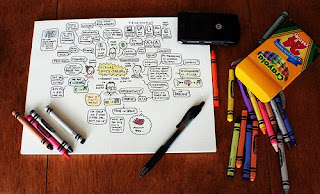
N.B. Although the following statements are "approved" this does not mean they can't be changed or improved upon.
Joseph BJohnny got His Gun, Slaughterhouse Five, and
The Red Badge of Courage all convey anti-war sentiments by showing how war can affect a man by mutilating him, causing him psychological stress, and giving him a false sense of courage.
JuliannaDick, Asimov, and Finney all show that acting out of selfishness, especially when given the unique power of time travel, ultimately results in negative effects on the society around them and/or on the time traveler himself.
ElizabethUncle Tom's Cabin, Pudd'nhead Wilson, and
Contending Forces show the equality of blacks and whites through stories which raise the unjustly low social status of blacks while loweing the unreasonably elevated status of whites.
AshleyCatch 22, Slaughterhouse Five, and
The Naked and the Dead convey an anti-war mentality by showing the effect of the imminence of death on the soldiers fighting in WWII through the use of realism, satire, and black humor.
MarcellaIn
O Pioneers!, My Antonia, and
A Lost Lady, Willa Cather uses symbolism and characterization to express man's ideal relationship to the land that benefits themselves and their community.
JenniferThrough their novels, Edith Wharton, Pearl S. Buck, and Louisa May Alcott depict the internal struggle between duty and desire that each man experiences through the normal course of life despite their social circumstances.
AnnmarieThrough their portrayal of romantic relationships in post-Reconstruction black communities, the authors of
Contending Forces, The Outsider, and
Not Without Laughter present divergent views of the black man's quest for happiness in the midst of racial oppression.
GabrielaThrough their depictions of self-righteous ways of life,
To Kill Black Boy, Uncle Tom's Cabin, and
To Kill a Mockingbird illustrate that some aspects of organized religion were actually contrary to natural law.
LarryThrough his use of satire in
The Celebrated Jumping Frog,
The Adventures of Tom Sawyer, and
The Connecticut Yankee in King Arthur's Court, Mark Twain provides a harsh critique of the immaturity of the American people in the mid-19th century.
PeterIn The Long Valley, Travels With Charlie, and The Short Reign of Pippin the IV, John Steinbeck shows that making choices based solely on human selfishness can be harmful to others and lead to ill effects on society.NaomiThrough the use of immature male protagonists, the authors of
A Separate Peace, Catcher in the Rye, and
The Outsiders depict the struggles of coming of age in mid-20th century America.
SeanIn his novels, Chaim Potok explores the conflict between tradition and modernity through the intrareligious differences of his characters and how they overcome these differences while still maintaining their faith without compromise.
OliviaEllison, Gaines, and Lee each treat the subject of racial injustice by depicting the search for individuality in an oppressive environment.
 I just received a mailer today announcing that the Cincinnati Shakespeare Company's next production will be Oscar Wilde's An Ideal Husband. Though not American literature, I know many of you enjoyed reading and performing Wilde's The Importance of Being Earnest last year. An Ideal Husband is slightly similar.
I just received a mailer today announcing that the Cincinnati Shakespeare Company's next production will be Oscar Wilde's An Ideal Husband. Though not American literature, I know many of you enjoyed reading and performing Wilde's The Importance of Being Earnest last year. An Ideal Husband is slightly similar.

